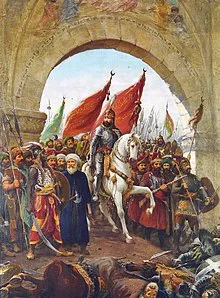
Resurrection will not happen until the time when you will be attacked with red-headed, small diagonal eyes and flat-nose tactics. They will come from the east and they will wear woolen skins, and their faces will be wide like shields. They will cover you in such a way that the flocks of locusts cover the sky. 'Sahih Bukhari: 2770.
This prediction was not false. Indeed, after six hundred years, there was a storm in the east, the world map was changed to the sword of Chengiz Khan.
In 1206, the reign of Emperor Chengiz Khan, which took place in the Mongolia's Stape Aadhavuno and some half-way some nomadic tribes, brought the whole world to the next twenty years before the Resurrection, the second Resurrection.
After the death of Chengiz Khan, the mongolas did not stop, they captured it almost the entire Middle East. By 1258, they came to Bagdad's doorstep, the Baghdad of Aravi Razani, Baghdad symbol of the golden age of the Abbasia Khilafat or Islamic civilization.
But the golden age of Islamic civilization had ended much earlier than it was.
Throughout the thirteenth century, there was the reign of monkeys in the direction of the earth. But in the meanwhile, a new power emerges in Egypt. Mamlukara protects Syria, Egypt and Mecca-Medina from the hands of the Mongols, fighting the life. The law began to change after the battle of Golat and Homes, the current flow of history.
The surviving Turkish Muslims escaped from the Mongols of the Chengiz Khan and started building Anatolia in the new civilization. One of them was Othman Araratur's son Othman.
At the end of the thirteenth century, the Muslim emirate born in Anatolia was the sultan of the smallest of them.
The story of the emergence of the Ottoman Sultanate from Usman began. An average life expectancy of an empire is usually from 100 to 150 years, then it gradually collapses. But there was no sign of the collapse of the Ottoman Sultanate which had been growing for a century. They had the basic principles of survival, good governance, justice and old people, with the mentality of accepting new ones. Thus, the Ottomans continued to be in the fifteenth century in a world power.